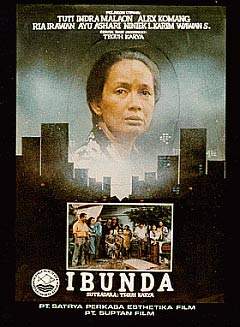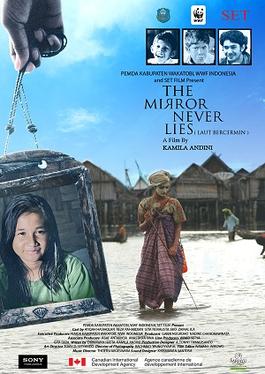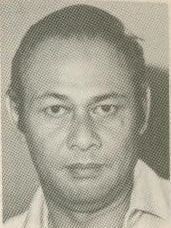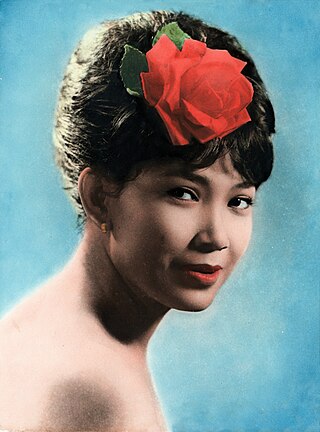
Suzzanna Martha Frederika van Osch, was an Indonesian actress. Known as the "queen of Indonesian horror", she is well known in particular in Indonesia for portraying spirits, witches, and other supernatural beings. She was crowned the best female antagonist in Indonesian film industry along with Ruth Pelupessy and Mieke Wijaya.

Herlina Christine Natalia Hakim is an Indonesian actress, film producer, and activist. Born to a devout Muslim family of a mixed-race background in Jambi, she grew up in Yogyakarta, aspiring to be an architect or psychologist. This changed after she was discovered by Teguh Karya for his 1973 movie Cinta Pertama, a role which garnered her a Citra Award for Best Actress and convinced her to follow a career in acting. Since then, she has starred in numerous films, including 1977's Badai Pasti Berlalu and 1988's Tjoet Nja' Dhien; she also had a minor role in the 2010 Hollywood movie Eat Pray Love. As of 2011, she has won six Citra Awards, received a lifetime achievement award from the Cinemanila International Film Festival, and served as a member of the jury at the Cannes Film Festival.

Teguh Karya was an Indonesian film director. Starting his entertainment career in theatre, he made his directorial debut with Wadjah Seorang Laki-Laki, released three years later. He later directed numerous critically acclaimed films, including Cinta Pertama, Badai Pasti Berlalu, and November 1828. In 2001 Karya died from complications from a 1998 stroke.

Slamet Rahardjo Djarot or better known as Slamet Rahardjo is an Indonesian actor, director, and screenwriter of Javanese descent. He is the elder brother of director, songwriter, and politician, Eros Djarot. Since his directorial debut in 1979 with Rembulan dan Matahari, he has directed and/or written twelve films; one of which, Langitku, Rumahku, was Indonesia's submission to the 63rd Academy Awards in 1991.
Khadijah Azhari, better known as Ayu Azhari, is an Indonesian actress, model and author of mixed Indian and Sundanese descent.

Ibunda (Mother) is a 1986 Indonesian film directed by Teguh Karya. Telling of a family's struggles in Jakarta, it set a new record at the 1986 Indonesian Film Festival when it won nine Citra Awards.
Wadjah Seorang Laki-laki is a 1971 Indonesian film directed by Teguh Karya. It marked his directorial debut.

Tuti Indra Malaon, born Pudjiastuti Suratno, was an Indonesian actress, dancer, and lecturer.

Djadoeg Djajakusuma was an Indonesian film director and promoter of traditional art forms. Born to a nobleman and his wife in Temanggung, Central Java, Djajakusuma became interested in the arts at a young age, choosing to pursue a career in theatre. During the Japanese occupation from 1943 to 1945 he was a translator and actor, and in the four-year national revolution which followed he worked for the military's educational division, several news agencies, and in drama.

Fifi Young was an Indonesian actress of mixed French and Chinese descent who acted in at least 86 films over her 34-year career.

The Mirror Never Lies is a 2011 Indonesian film directed by Kamila Andini and co-produced by Andini's father, Garin Nugroho, and former Puteri Indonesia Nadine Chandrawinata. Starring Gita Novalista, Atiqah Hasiholan, and Reza Rahadian, it follows a young Bajau girl named Pakis who has lost her father at sea and uses mirrors to unsuccessfully search for him. It has several interpretations, including as a coming-of-age story and as an environmentalist piece.
The Citra Award for Best Director is an award given at the annual Indonesian Film Festival (FFI) to Indonesian film directors in recognition for their achievement in the previous year. The Citra Awards, described by Screen International as "Indonesia's equivalent to the Oscars", are the country's most prestigious film awards and are intended to recognize achievements in films as well as to draw public interest to the film industry.

Mieke Wijaya was an Indonesian actress, model, and politician who won three Citra Awards. She was crowned the best female antagonist in Indonesian film industry along with Suzzanna and Ruth Pelupessy. Wijaya began her career as a teenager and soared to popularity by partaking a role in Usmar Ismail's commercially successful Tiga Dara, her name became increasingly popular after starring in the soap opera Losmen in 1987.

Zainal Abidin was a Citra Award-winning Indonesian actor who played in more than a hundred and fifty films.
The Citra Award for Best Supporting Actress is an award given at the Indonesian Film Festival (FFI) to Indonesian actresses for their achievements in a supporting role. The Citra Awards, described by Screen International as "Indonesia's equivalent to the Oscars", are the country's most prestigious film awards and are intended to recognize achievements in films as well as to draw public interest to the film industry.

Niniek L. Karim is an Indonesian actress who has won two Citra Awards for Best Supporting Actress.

Rara Patma Dewi Tjitrohadiseikusumo, best known under her stage name Chitra Dewi, was an Indonesian actress and director. She was noted for her roles in Usmar Ismail's films of the 1950s, appearing in films such as Tamu Agung, Tiga Dara, and Pedjuang, although she remained active in cinema until 1993 and won a Citra Award for Best Supporting Actress at the 1979 Indonesian Film Festival for Gara-gara Isteri Muda. Dewi also had a brief stint film directing in 1971, making her one of only four Indonesian women to direct a film before 1998.
The 2nd Annual Maya Awards was an award ceremony honoring the best in Indonesian films of 2013. The ceremony was held in Hotel Umaniara De'Brawijaya, Kebayoran Baru, South Jakarta, on December 21, 2013.

Tiga Dara is a 1957 Indonesian musical comedy film starring Chitra Dewi, Mieke Wijaya, and Indriati Iskak. Directed by Usmar Ismail for Perfini, the film follows three sisters who live with their father and grandmother. When the eldest sister, Nunung, shows no interest in marrying, her family tries unsuccessfully to find a husband for her. Nunung initially rejects the advances of a young man named Toto, who instead dates her younger sister. However, when he becomes jealous and travels from Jakarta to Bandung to profess his love, she agrees to marry him.

Marjolein Tambayong, better known by her stage name Rima Melati or by her nickname Lientje, was an Indonesian actress, model, and singer. She appeared in close to one hundred feature films, including works by Wim Umboh, Sjumandjaja, and Teguh Karya. She received multiple awards, including a PWI Award for Best Actress for Noda Tak Berampun, a Citra Award for Best Leading Actress for Intan Berduri, and five nominations for the Citra Award for Best Supporting Actress.














